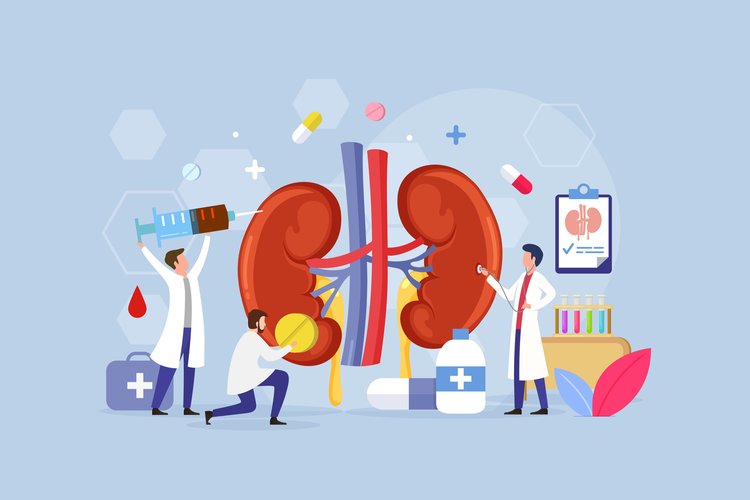The Latest Kidney Disease News And Research
Kidney Disease research is being done every day to assist the over 37 million adults in the United States that suffer from kidney disease. The latest in kidney disease research and news indicates advancements and changes in the treatment of kidney disease that can exponentially benefit those who suffer from kidney disease.
Midwest Nephrology adapts and honors advancements in research. Our team of providers diligently research treatments and new practices to provide our patients with the best and most advanced care. A few of the most recent items published include research on Aldosterone worsening Kidney Disease, experimentation with changing Kidney Transplant Blood Type, as well as studies involving Pediatric Neuropsychiatric conditions.

ALDOSTERONE LINKED TO WORSENING KIDNEY DISEASE
Aldosterone, a hormone produced by the triangular adrenal glands, is a crucial, salt-conserving hormone. In a nearly 10-year observational study, researchers analyzed data from 3,680 people with chronic kidney disease. Those with elevated levels of aldosterone had a higher risk of serious kidney disease progression during the study period. This means they are more likely to lose half of their kidney function, begin dialysis treatment, or develop end-stage kidney disease.
You may be wondering how aldosterone is linked to kidney disease. For someone that is dehydrated or has low blood pressure, this hormone can help conserve water and salt, but if the levels of aldosterone are consistently present at a high concentration within the body, it can cause kidney damage. When aldosterone is constantly at a high level, it can lead to hypertension (high blood pressure), which can then lead to damage to the kidneys and heart.
Kidney Specialist Ashish Verma, an assistant professor of medicine at Boston University School of Medicine highlighted the drug, Finerenone, a nonsteroidal drug approved by the FDA for people with type 2 diabetes and chronic kidney disease. Verma said that Finerenone can help prevent kidney disease, or its progression in people without diabetes, with a lower risk of causing dangerously high potassium levels than traditional therapies such as spironolactone or eplerenone.
A CHANGE IN KIDNEY TRANSPLANT BLOOD TYPE
In a ground-breaking discovery, researchers at the University of Cambridge have successfully altered the blood type of three donor kidneys. Professor Mike Nicholson and PhD student Serena MacMillion used a normothermic perfusion (a device that connects with a human kidney to pass oxygenated blood through the organ to better preserve it for future use) to flush blood infused with an enzyme, through a deceased kidney. This enzyme removed the blood type markers that line the blood vessels of the kidney, resulting in the kidney being converted to the universal O type. Changing the blood type to the universal O will allow for more transplants to take place.
The Cambridge team will now need to determine how a newly altered O-type kidney will react to a patient’s usual blood type in their normal supply. With the use of a perfusion machine, this process can be simulated before doing so on a patient. With the perfusion machine, they will take the new O-type kidneys, and introduce different blood types to observe how they react.
One of the biggest restrictions to a donated kidney transplant is that the blood type must be compatible. Antigens and markers on your cells are either A or B, and your body produces antigens against the markers that you do not have. With the discovery of altering blood types, patients will have easier access to kidney transplants compatible with their blood type.
PEDIATRIC NEUROPSYCHIATRIC CONDITIONS LINKED TO RARE GENETIC VARIANTS
Early genomic testing could help identify an increasing number of genomic variants associated with intellectual disabilities, and the likelihood of those children developing neurodevelopmental or mental health conditions. This allows for intervention as soon as possible.
For children presenting developmental delays, or intellectual disabilities, exome or genome sequence analysis is recommended. Previously, there has been a limitation on rare genomic variants and the long-term outcomes for those children. The existing research is limited to small sample sizes or portions of children with moderate to severe disabilities. A recent study published in The Lancet Psychiatry aimed to evaluate the influence of environmental and genetic factors on the prognosis.
This study is the largest to date and measures the impact of rare genetic variants associated with intellectual disability. It was found that the children are likely to develop other neurodevelopmental or mental health conditions. An identifiable genetic cause was found to amplify the likelihood of neurodevelopmental conditions, as well as behavioral difficulties. Physical health problems were also prevalent in the study, reporting things such as disturbed sleep, motor or movement disorders, fine motor problems, and cerebral palsy.
CONTACT MIDWEST NEPHROLOGY ASSOCIATES TODAY
Have any questions or concerns? Our dedicated team of physicians and certified staff are here to help answer all your questions and can help set up an appointment for you or a loved one. Contact Midwest Nephrology Associates for more information on Kidney Cancer and for help finding a treatment that works best for you.